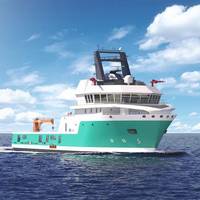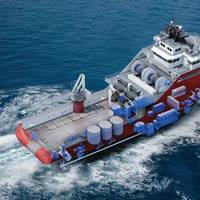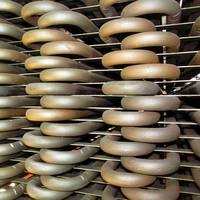ABS Verifies Non-flammable Blue G Battery System Design

Classification society ABS announced it has issued New Technology Qualification (NTQ) for non-flammable battery technology for use at sea.Called Blue G, the vanadium redox flow battery system from Gennal Engineering PTE LTD is now planned to move into prototype testing later this year.The Blue G battery is comprised of a water-based electrolyte solution, storage tank, stack cell and regulating pump. The process of charging and discharging energy does not produce excess heat –…
Preparing for IMO 2020: Marine Emission Solutions

Part I: Enhancing Engines & Fuels"Wood Mackenzie forecasts a 25 percent increase in price for lower sulfur content fuel based on a SOx scrubber adoption rate of about two percent, but some scenarios could cause LSFO prices to spike by as much as 60 percent."Around 80 percent of global trade is carried by sea. With more than 125,000 commercial and naval vessels operating around the world, ship-engine emissions are projected to rise by 250 percent by 2050 unless controls are imposed.
Glencore Sees Record Oil Trading Volumes as Margins Shrink
Glencore looks set to cement its position as the world's second-largest oil trader as it tries to offset low volatility and tight margins with record volumes this year, its global head of oil, Alex Beard, told Reuters. The London-listed commodities trader and miner will shift around 6 million barrels per day (bpd) of crude and refined product this year, up 25 percent from last year. The figure represents around 6 percent of global supply and only rival Vitol trades more oil, at some 7 million bpd. Most merchants are being forced to ramp up volumes to protect profits in an environment of low volatility. "We don’t set targets in terms of volumes," Beard told the annual Reuters Global Commodities Summit.
WSS: Post-combustion Fuel Treatment Cuts Vessel Costs, Risk

Wilhelmsen Ships Service, a provider of products and services to the shipping industry, is advising vessel operators to wage war on soot. According to WSS, soot accumulation in a ship’s exhaust gas boiler (EGB) is a serious issue, leading to reduced EGB efficiency, significant cleaning costs, corrosion, and the risk of soot fires. However, a simple post-combustion fuel treatment can solve all these problems, at negligible cost. Refined heavy marine fuels are full of contaminants, such as Vanadium, Sodium, Aluminium, Silica, and Potassium, which leave deposits when burnt.
PRI Treatment Helps Meet Emissions Challenges
Power Research Inc. (PRI) is a manufacturer of industrial grade fuel treatments designed to treat heavy fuel oil, diesel and gasoline. Founded in 1985, PRI chemistries incorporate proprietary thermal stability technologies that permit cleaner combustion, reduced emissions, and prevention of deposits on engine components and boiler tubes. PRI offers PRI-R, a heavy fuel oil treatment that overcomes operability issues associated with carbon, vanadium, sulfur and sludge. First, PRI-R is a maintenance product. PRI-R has been proven to prevent carbon and vanadate deposits results in extended time between component overhauls, hence providing added value and reliability to our vessel owners, increasing bottom line profitability.
EP Proposal re Atmospheric Emissions from Ships
The European Parliament issued a Press Release stating, in pertinent part, that an initiative is being proposed that would, if adopted, expand restrictions on atmospheric emissions from seagoing ships to include polycyclic aromatics (such as PAH) and heavy metals (e.g., nickel and vanadium). Source: HK Law
Lubricant Technology Proven Tough Under Fire
When Texaco, now represented in the marine lubricants market by FAMM (Fuel and Marine Marketing), launched Taro 40 XL 40, the lubricant was designed to address pressing field problems in medium speed engines. Three years later FAMM is in a position to evaluate the performance in a large number of engines and to compare the field results with competitive lubricants. The pressing problems arose from a series of engine design and fuel processing changes. Although aimed at improving engine efficiency and making savings, the changes resulted in a series of difficulties. The best known are engine blackening, undercrown deposits, piston head corrosion, fouling of purifier heaters, increased oil consumption, base number depletion, oil scraper ring clogging and increased piston deposits.
BIMCO offers new Standard Bunker Contract
When BIMCO published the "Fuelcon" Standard Marine Fuels Purchasing Contract in 1995, it received only a modest welcome from the bunker industry. Although a standard contract of this type had been long-awaited by those involved in the marine fuels sector, "Fuelcon" was not widely adopted. The general feeling in the industry was that BIMCO, in an attempt to redress the balance of often onerous suppliers' terms and conditions then in general usage, had produced a standard form of contract that was too biased towards the buyers. Although failing to achieve dominance in the market, the "Fuelcon" initiative successfully raised awareness in the bunker sector of the need for a set of standard terms and conditions acceptable both to buyers and sellers.
MARPOL Compliance Needs Action Now Says Lintec
warns Lintec, the international marine fuels analysis specialist. 2005, owners and suppliers need to take action sooner. practice, vessel design, engine room and bunkering procedure. be met. body within their state. copies of bunker receipts and samples. vessel, based on the high vanadium result of the fuel. minimal damage.





